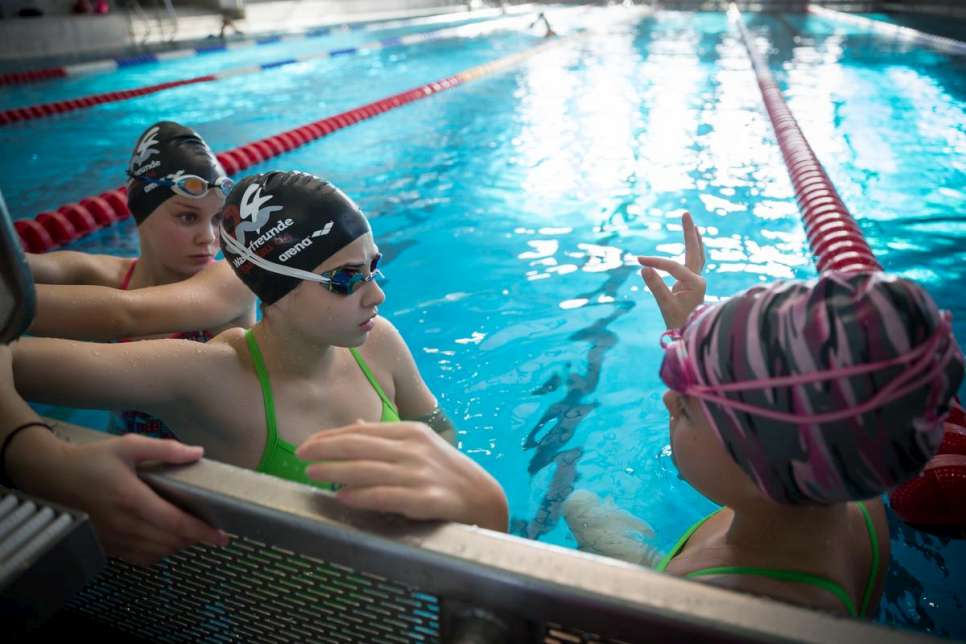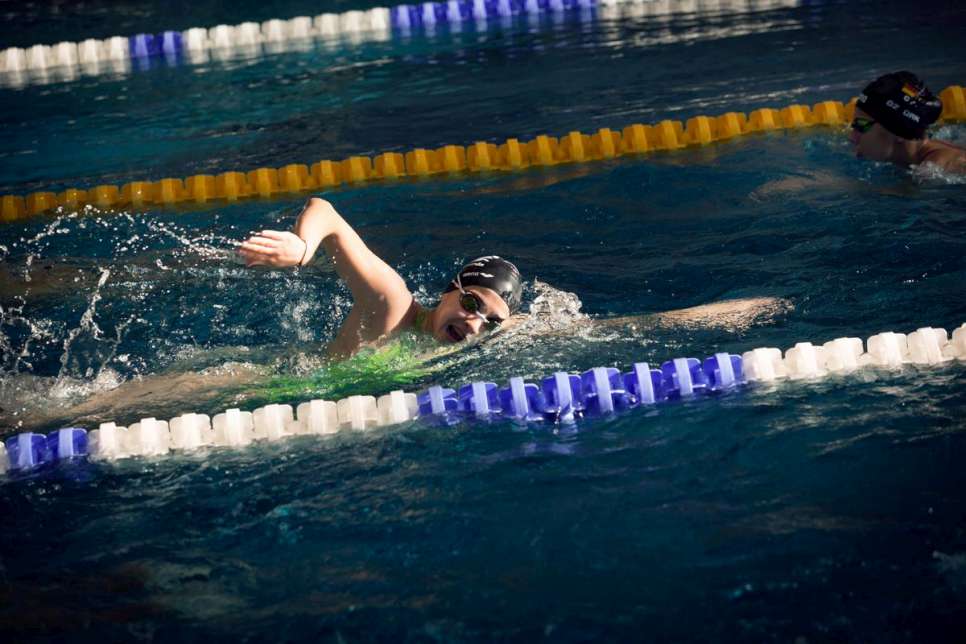Syrian refugee eyes Rio Olympics
Yusra has dreamt of the Olympics for years. Now a refugee in Germany, she hopes to qualify to compete at the Games in Brazil.
Yusra Mardini (age 17), during a training session at the swimming club Wasserfreunde Spandau 04.
© UNHCR/G.Welters
The flimsy vessel, crammed with some 20 people, had just reached open water off the Turkish coast when the engine died. A dreadful silence followed. Yusra Mardini saw terror in the eyes of her fellow passengers as the inflatable dinghy began taking on water. Most of the others could not swim, but 17-year-old Yusra could.
Unflinching, the trained athlete and her elder sister, Sarah, slipped into the sea. Together, they kicked up the dark water behind them, pushing the boat, straining their ears for signs of life from the dead engine. It never came.
Three-and-a-half hours later, the sisters and two other passengers, who had joined them in the water and copied their actions, were still swimming, kicking the dinghy slowly towards the shore of Europe. They were frozen and exhausted, but took strength from their determination not to let anyone die.
Barely nine months later, seated on the edge of the pool at Berlin’s Olympic stadium, Yusra grins. Her eyes shine as she recalled the heroic act she and her sister carried out.
“It would have been shameful if the people on our boat had drowned,” she told UNHCR, the UN Refugee Agency. “There were people who didn’t know how to swim. I wasn’t going to sit there and complain that I would drown. If was going to drown, at least I’d drown proud of myself and my sister.”
Miraculously, the disabled boat washed up on the Greek island of Lesvos. Everyone survived, thanks to the swimmers. But now they had even lost the shoes on their feet. The sisters set off on the Western Balkan route for Germany where they hoped to be able to rebuild their lives.
Yusra could not have guessed then that she would soon be preparing for another journey, under very different circumstances. The dream she has nurtured for more than a decade may soon come true. This summer, she hopes to travel to the Olympic Games in Rio de Janeiro, as part of a team representing millions of refugees fleeing war and persecution throughout the world.
“I’m going to make them proud,” Yusra said. “I want to represent all the refugees because I want to show everyone that, after the pain, after the storm, comes calm days. I want to inspire them to do something good in their lives.”
“I’m going to make them proud… I want to inspire them to do something good in their lives.”
“I want everyone not to give up on their dreams and do what they feel in their hearts,” she added. “Even if it’s impossible, even if they don’t have the right conditions, you never know what will happen, just keep trying. Maybe you’ll get a chance like I did. Or maybe you’ll make your own chance.”
It is that tenacity that has helped her overcome many obstacles, says her coach, Sven Spannekrebs. He met Yusra and her sister Sarah when they were referred to his club, Wasserfreunde Spandau 04, by a local charity not long after they arrived in Berlin.
They soon became good friends, exchanging stories about their lives after training every evening. Spannekrebs even helped Yusra and her sister with the German paperwork they needed to gain official refugee status.
“It’s not just a coach-athlete relationship – it’s more,” said Spannekrebs. “It’s a friendship, a good friendship. There’s trust in both directions. But in training there’s no difference between Yusra and the others.”
Spannekrebs was amazed at how quickly Yusra improved, despite having had her training disrupted by war. “She learned really fast. After four weeks I said to her, ‘Our goal must be the 2020 Tokyo Olympics,’ ” he told UNHCR.
That was before the International Olympic Committee (IOC) identified Yusra and 42 others for its team of Refugee Olympic Athletes. If she achieves a qualifying time, Yusra will be among between five and 10 finalists to be announced in June.
None of these athletes would normally be able to participate in the Olympics because their status as refugees has deprived them of a home country to represent. The IOC says the team will march just behind the Olympic flag, and ahead of their Brazilian hosts, at the opening ceremony on 5 August.
“You never know what will happen, just keep trying. Maybe you’ll get a chance like I did. Or maybe you’ll make your own chance.”
IOC President Thomas Bach told the UN General Assembly last October: “We help [high-level refugee athletes] to make their dream of sporting excellence come true, even when they have to flee from violence and hunger…”
He added: “This will be a symbol of hope for all the refugees in our world, and will make the world better aware of the magnitude of this crisis.”
If she makes it to Rio, Yusra says she will treat it as a springboard to the 2020 Games in Tokyo. However, uncertainty over her country’s future means it is difficult to make concrete plans. “Of course I miss Syria,” she said. “I think after the war stops I will go back with experiences, with everything, and I will teach everyone what I had here in Germany.”








